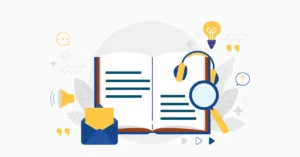
IGCSE English as a Second Language: Listening, Writing, and Speaking
Preparing for your IGCSE English as a Second Language (ESL) exam can feel daunting. You are not just learning grammar
Learn how to write step-by-step answers, and score A* in your exam!

Announcement: Cambridge IGCSE, O Level and AS & A Level June 2025 past papers are now available.
A summary is a shortened version of a passage containing the key points in as few words as necessary. The summary exercise requires the ability to identify the main ideas, express them in one’s own words, and arrange them in a logical sequence, all while adhering to a word limit.
Content. Answer directly the question and focus on the relevant points only. Use as much material as possible; while exercising caution towards any irrelevant details. Take points directly from the passage and avoid repeating similar points, even if they were mentioned twice.
Your summary must be supported by references and directly connected to the passage. Adding facts or opinions is not suggested since this exercise is meant to summarise, not add to the original ideas. You will only obtain content marks when you provide the right content.
Language. Write your summary in your own words as far as possible. Although the message must be the same, the wording must be different. The replaced words must convey the essence of the point. Only change the words when appropriate. Therefore, there is no need to find synonyms for technical objects, e.g., solar heaters.
Lifting a few words is acceptable if it shows evidence of understanding and focuses on key details. But avoid over-lengthy lifting and quoting straight from the passage. Find precise words to use and vary your choices.
Writing Style. Express the key points clearly, succinctly, and fluently using an impersonal and formal writing tone. Connect your ideas into a paragraph to organise and sequence points cohesively. Try to use complex sentences instead of simple or compound structures, and ensure that you use correct spelling, punctuation, and grammar.
Avoid any introductions and conclusions, and instead, begin your summary with the exact wording of the question. Then, do not include examples, repetition, direct speech, figurative language, and minor details in your summary. Lastly, ensure that your ending is strong and impactful.
Word Limit. Always write your summary within the word count, as this exercise assesses the ability to write concisely. There are no penalty marks for writing more or less. However, it may be self-penalising to write more than suggested. Going over the word limit implies poor structure or unclear ideas. On the other hand, writing way too less than the limit may mean the response does not have sufficient coverage. For example, if the question requires 200 to 250 words, but you only provide 180 words, there is a chance that you do not include sufficient points.
Before the exam, check how many words you write on a line; then, you’ll know approximately how many lines you will need. Lastly, do not write beyond the lines given to avoid your answers not fitting into the scanned screen.
Join 62,169 (and counting) IGCSE & AS/A Level subscribers who've taken our insanely valuable FREE email courses. Learn exam tips & score A* in your exam!
| Prefix | Meaning | Examples |
|---|---|---|
| anti- | against/opposed to | anti-government, anti-racist, anti-wat |
| auto- | self | autobiography, automobile |
| de- | reverse or change | de-classify, decontaminate, demotivate |
| dis- | reverse or remove | disagree, displeasure, disqualify |
| down | reduce or lovwe | downgrade, downhearted |
| extra- | beyond | extraordinary, extraterrestial |
| hyper | extreme | hyperactive, hypertension |
| il-, im-, in-, ir- | not | illegal, impossible, insecure, irregular |
My daughter got an A*
“My daughter got an A* for her English First Language! Skolatis gave her the confidence she needed.”
~ Carrie (Malaysia)
In 2024, Cambridge IGCSE removed the summary task from its English as a Second Language Reading and Writing paper.
Find out in our A* Model Answers. Copy the style and score A*!
Come join our A* revision courses that are designed based on proven A* scoring system, move up your level and reach your A*!
* Note: Some relevant info taken from CIE.
Join 62,169 (and counting) IGCSE & AS/A Level subscribers who’ve taken our insanely valuable FREE email courses. Learn exam tips & score A* in your exam!
Tan
Tan
Kanishka Bhindora
Kanishka Bhindora
Arun Joseph
Botswana
Arun Joseph
Botswana
Sree Sundararaman
Sree Sundararaman
Nisha
Nisha
Rachel Miller
Rachel Miller
Ved Vyas
Kenya
Ved Vyas
Kenya
Adriano Jose
Adriano Jose
Feras
United Arab Emirates
Feras
United Arab Emirates
Tino Mutangadura
South Africa
Tino Mutangadura
South Africa

Preparing for your IGCSE English as a Second Language (ESL) exam can feel daunting. You are not just learning grammar

Choosing the right educational pathway for your child is one of the most significant decisions a family can make. In

The IGCSE English First Language exam places a strong emphasis on creative writing, with writing descriptive and narrative essays being

In the IGCSE English First Language Directed Writing task, you’ll be required to either write a speech, letter, or article
89 responses
HI
Is it possible to enrol for a short term course for IGCSE English First Language and get prepared for FEB/MAR exam?
I am not good and I am ready to put my effort
Hi Saisubha,
Thank you for your message.
Yes, we have single payment courses where students can access all the materials at once for four months. Students will have the flexibility to go through the course at their own pace and complete it before their exams.
For English subjects, students can submit writing practices for marking. For more information, please visit this page: https://www.skolatis.com/single-payment-option/.
Keep on practising and putting in the effort, and results will follow.
If you have further questions, please feel free to write to us.
For the First Language English (0500) paper 1 how many minutes should we spend on each question? For example, the comprehension component, the summary, the writer’s effect, and the directed writing (journal, letter, article, etc.)
Hello Milah,
Our suggestion is to pay close attention to the marks available to make sure that you are spending the right amount of time and effort on each part of your exam. Do not write rough drafts. You cannot afford the time to write out every answer twice, and it is neither required nor desirable that you should do so; plans are sufficient.
Make sure that you plan your time in the exam to allow for you to edit your answers – leave time to CHECK and CHANGE. You will almost certainly have made a mistake somewhere or be able just to add in a detail – those changes could make all the difference to your final answers.
We suggest that you practice with past exam papers (https://www.skolatis.com/cambridge-igcse-past-exam-papers/). Simulate the test environment by turning off your phone and isolating yourself in your classroom or in the library, and give yourself only the amount of time you will be allotted during the actual test.
We hope this helps.
Is it important to divide your summary in paragraphs?
And if yes then how many should we keep maximum.
I’m asking about second language English.
Thanks!
Hello Rosette,
For summary writing, the focus should be on accuracy, cohesion and not exceeding the word limit. We suggest that you write in one coherent paragraph that conveys the relevant content points.
You might be interested with our A* Exam Model Answers. You will able to see what is an A* answer like: https://www.skolatis.com/igcse-exam-resources/
You can also consider our English Second Language course where we are able to provide a more comprehensive guide to fulfil your needs. Have a read at this page to learn how it works: https://www.skolatis.com/online-courses/
We hope this helps.